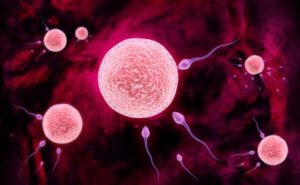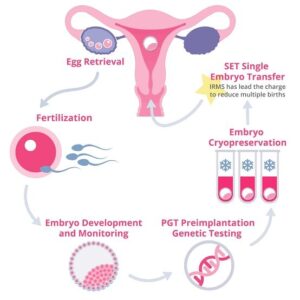Fertility
The capability of persons to procreate is called
fertility. The reproductive system consists of
organs and hormone-producing networks that
work together to procreate. In order, to
reproduce both female and male have to be
fertile.
Normally, fertility allows a man to produce
sufficient amount of healthy sperm, release those
cells into vagina and successful passing of them
from uterus to fallopian tube and produce a
normal egg. A fertilised egg must also be implanted in the endometrium of a woman for
successful pregnancy. Problems with any of these stages can lead to infertility in couples.
Infertility
In contrast to fertility, infertility is defined as a couple's inability to conceive and reproduce
after about an year of regular intercourse without contraception.
Infertility may affect both men and women and it can result from many causes. About one in
ten couples, that is 10 to 15 percent of population, suffers from infertility.
Infertility in Pakistan
Infertility in Pakistan's society is not only a medical problem but also a social issue. Cultural
practices recognise infertility as failure at personal, interpersonal and social level. In order to
seek medical assistance correctly and timely, awareness and fair knowledge of infertility is
essential.
The most used method after medications that is opted by infertile couples in Pakistan is IVF
(In Vitro Fertilisation). Although, IVF still remains an unacceptable option for many people in
Pakistan instead, people prefer using medications for conceiving yet, IVF has been
recognized as a religiously acceptable method for precreation if the sperm and egg used is
of the couple legally married. Also, those who have fair knowledge in this regard mostly opt
for IVF.
IVF Centres in Pakistan
IVF Centres or fertility clinics, work for the assistance of couples who want to conceive but
are unable to do so naturally because of medical reasons. Specialists at the IVF centres
perform various tests in order to prepare the couple for the treatment to achieve
pregnancy.
There are a number of fertility centres in Pakistan providing IVF treatment and spreading
awareness due to the misconceptions regarding the treatment. Out of which ACIMC has
proved to be the best for IVF treatment. It uses latest technology and equipment and
extremely groomed specialists are present for assistance and procedure. ACIMC has proved
to be the best IVF centre in Lahore as well as in entire Pakistan.
IVF Cost in Pakistan
IVF is an expensive treatment but comparatively the cost of IVF in Pakistan is cheaper as in
other countries such as USA and UK. IVF cost in Pakistan is one third of the cost of IVF
treatment in Dubai. One IVF cycle fees including medication, procedures, ultrasounds, tests,
laboratory work and embryo storage can be over $15,000 in foreign countries. The total cost
of procedure abroad can be anywhere between 40 to 60 thousand dollars but in Pakistan
the cost of IVF procedure is less comparatively.
IVF Cycle; IVF Procedure
Through IVF, mature eggs are retrieved from ovaries of female then fertilised with sperm in
laboratory. The embryo then is transferred to the uterus of female.
An entire cycle of IVF takes about three weeks to complete but sometimes this process can
take longer time to complete. IVF is also one of the most effective way to conceive. The
procedure of IVF involves:
1. Ovulation Induction in which ovaries are stimulated to produce multiple eggs. It is
done because sometimes an
egg do not develop adequately
for fertilisation or one egg may
not be fertile enough.
2. After about 36 hours of final
injection, eggs are retrieved
from female.
3. Meanwhile, sperm is also
retrieved from the male for the
purpose of creating embryos.
4. The matured eggs are then
mixed with sperm, but not all
eggs are fertilised. Eggs are
fertilised by conventional
insemination or ICSI (Intra-
cytoplasmic sperm injection).
5. The embryo made is then transferred back to the female’s uterus.
Causes of Infertility
1. In Women:
Following factors may contribute to infertility in women
Abnormal Menstruation
Blocked Fallopian Tube
Celiac Disease
Previous Tubal Pregnancy
Pelvic Inflammatory Disease
PCOS (Polycystic Ovary Syndrome)
Uterine problems such as, Endometriosis, Uterine polyps and fibroids
Fibroid Disease
2. In Men:
Following factors can cause infertility in men
Abnormal production of sperm
Genetic Disease
Premature ejaculation
Azoospermia
Misuse of anabolic steroids
Testicular Cancer
Undescended Testicles
Treatment of Infertility
Treatment for infertility varies depending upon its cause. Sometimes, infertility cannot be
treated but most of the times it can be treated. Often, pregnancy can be achieved through
ART (assisted reproductive technology), following treatments can be opted for infertility:
Intra-cytoplasmic sperm injection (ICSI)/In Vitro Fertilisation (IVF)
Assisted hatching
Sperm Retrieval for men
Stimulating ovulation with fertility drugs for women.
Intra-uterine insemination (IUI)
Surgery to restore fertility
Gestational Carrier
Donor eggs or sperm
